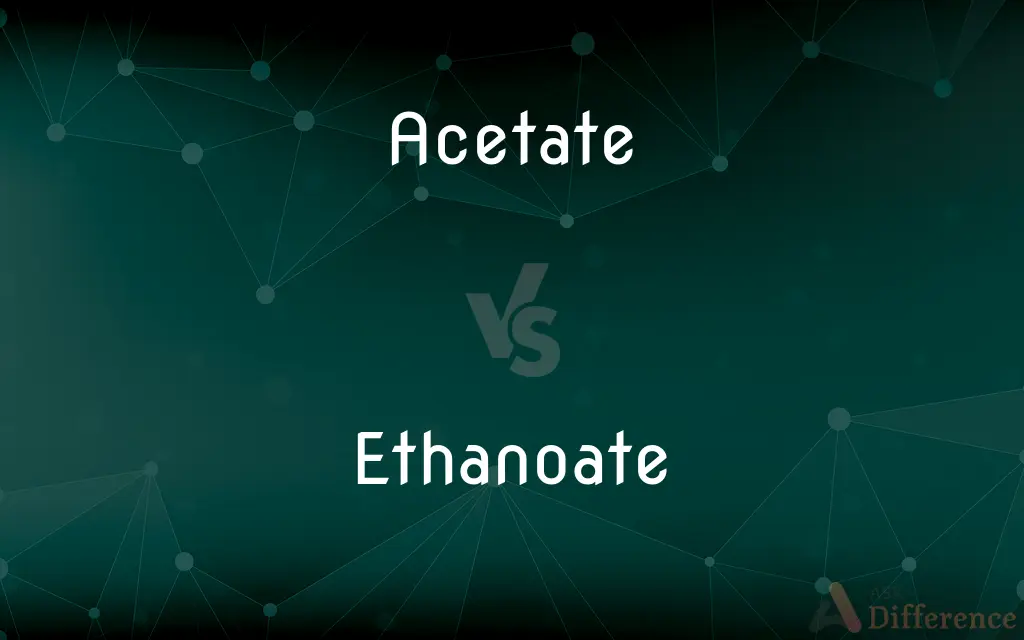Acetate vs. Ethanoate — What's the Difference?
By Tayyaba Rehman & Urooj Arif — Updated on April 24, 2024
Acetate is commonly used in American English, while ethanoate is its equivalent in systematic IUPAC nomenclature, both representing the anion derived from acetic acid.

Difference Between Acetate and Ethanoate
Table of Contents
ADVERTISEMENT
Key Differences
Acetate is the term widely used in American English, particularly in non-scientific contexts, referring to the negatively charged ion (CH3COO-) or esters of acetic acid. Whereas, ethanoate is the preferred term in the International Union of Pure and Applied Chemistry (IUPAC) nomenclature, emphasizing its chemical structure and standardization in scientific communications.
In everyday usage, products containing acetate, like acetate fabrics or acetate film, are familiar to the general public. On the other hand, ethanoate is more often encountered in academic and professional chemistry settings, where precise and systematic chemical terminology is crucial.
Acetate salts, such as sodium acetate, are commonly discussed in both industrial and food applications, highlighting their practical uses. Conversely, ethanoate, while chemically identical, is less frequently referred to by this name in these same contexts, instead, its use is mainly restricted to technical discussions among chemists.
The naming convention of acetate aligns with older, more traditional chemical nomenclature, making it more accessible and commonly recognized. In contrast, ethanoate reflects a more systematic approach to chemical naming, consistent with modern chemical education that emphasizes molecular composition and structure.
While the term acetate might appear in educational materials at the secondary school level or in generalist texts, ethanoate is typically reserved for university-level chemistry courses and scholarly articles, underscoring its role in formal scientific discourse.
ADVERTISEMENT
Comparison Chart
Nomenclature
Traditional common name
Systematic IUPAC name
Usage Context
General, non-scientific
Academic, scientific
Common Forms
Salts, esters
Mentioned in theoretical chemistry
Educational Level
Secondary education
Higher education (universities)
Recognition
Widely recognized in everyday contexts
Used in specialized scientific communication
Compare with Definitions
Acetate
A synthetic fiber derived from cellulose.
Acetate fabrics are popular for their silk-like appearance.
Ethanoate
Mentioned in the context of molecular formula representation.
Ethanoate is represented as C2H3O2- in chemical equations.
Acetate
An ion (CH3COO-) derived from acetic acid.
The acetate ion plays a crucial role in metabolic processes.
Ethanoate
A systematic IUPAC name for acetate.
Ethanoate is used interchangeably with acetate in chemical literature.
Acetate
A plastic film used in photography.
Acetate film is valued for its stability and clarity.
Ethanoate
Found in academic discussions about esters and salts.
Ethyl ethanoate is a commonly studied ester in organic chemistry.
Acetate
A residue of acetic acid, when part of a compound.
Cellulose acetate is used in making spectacle frames.
Ethanoate
Refers to the anion derived from ethanoic acid.
Ethanoate ion is essential in various biochemical reactions.
Acetate
An acetate is a salt formed by the combination of acetic acid with a base (e.g. alkaline, earthy, metallic, nonmetallic or radical base).
Ethanoate
Used to emphasize systematic chemical education.
The use of ethanoate in teaching helps students understand chemical nomenclature better.
Acetate
A salt or ester of acetic acid, containing the anion CH₃COO⁻ or the group —OOCCH₃.
Ethanoate
(organic compound) The acetate anion [C2H3O2]−, a carboxylate and the conjugate base of ethanoic acid (acetic acid).
Acetate
Cellulose acetate, especially as used to make textile fibres or plastic
Acetate silk
Ethanoate
A salt or ester of acetic acid
Acetate
A salt or ester of acetic acid.
Acetate
Cellulose acetate or any of various products, especially fibers, derived from it.
Acetate
(organic chemistry) Any salt or ester of acetic acid.
Acetate
Cellulose acetate.
Acetate
A transparent sheet used for overlays.
Acetate
Ellipsis of acetate disc: a disc of aluminium covered in a wax used to make demonstration copies of a phonograph record.
Acetate
A salt formed by the union of acetic acid with a base or positive radical; as, acetate of lead, acetate of potash.
Acetate
A salt or ester of acetic acid
Acetate
A fabric made from cellulose acetate fibers
Common Curiosities
Why is ethanoate important in chemistry?
Ethanoate is important for maintaining consistent and standardized chemical nomenclature in educational and professional settings.
Can acetate and ethanoate be used interchangeably?
Yes, in terms of chemical composition, acetate and ethanoate can be used interchangeably, though the context might influence the preferred term.
How is acetate produced?
Acetate is typically produced through the reaction of acetic acid with a base.
What is acetate used for?
Acetate is used in various applications including textiles, as a food preservative, and in photographic film.
How do educational levels affect the use of acetate vs. ethanoate?
Acetate is more commonly used in secondary education, while ethanoate is used in higher education settings.
Is acetate environmentally friendly?
Yes, especially in forms like cellulose acetate, which is biodegradable and made from renewable resources.
What is the difference in the usage of acetate in industry compared to ethanoate?
In industry, the term acetate is more commonly used, especially when referring to salts and esters, whereas ethanoate is primarily used in academic and scientific discussions.
What are the safety concerns with acetate?
Acetate is generally considered safe but can be irritating to the eyes and skin in its concentrated form.
Are acetate and ethanoate found naturally?
Both forms are found in nature, often as a result of the decomposition of biological materials.
What is a common misconception about acetate?
A common misconception is that acetate and acetic acid are the same, whereas acetate is actually a derivative or anion of acetic acid.
Is there a trend in changing the usage of acetate to ethanoate in scientific literature?
There is a gradual trend towards using systematic names like ethanoate in scientific literature to align with global nomenclature standards.
What role does acetate play in food preservation?
Acetate, particularly in the form of sodium acetate, is used as a buffer and an antimicrobial agent in food preservation.
Can ethanoate be synthesized in a laboratory?
Yes, ethanoate can be synthesized by reacting ethanol with acetic acid under controlled conditions.
Why might a chemist prefer to use ethanoate over acetate?
A chemist might prefer ethanoate for its precision in scientific writing and communication.
What are the health benefits of acetate?
Acetate serves as a source of energy for many types of bacteria in the human gut, promoting digestive health.
Share Your Discovery

Previous Comparison
Coworker vs. Peer
Next Comparison
Leather vs. LatexAuthor Spotlight
Written by
Tayyaba RehmanTayyaba Rehman is a distinguished writer, currently serving as a primary contributor to askdifference.com. As a researcher in semantics and etymology, Tayyaba's passion for the complexity of languages and their distinctions has found a perfect home on the platform. Tayyaba delves into the intricacies of language, distinguishing between commonly confused words and phrases, thereby providing clarity for readers worldwide.
Co-written by
Urooj ArifUrooj is a skilled content writer at Ask Difference, known for her exceptional ability to simplify complex topics into engaging and informative content. With a passion for research and a flair for clear, concise writing, she consistently delivers articles that resonate with our diverse audience.














































